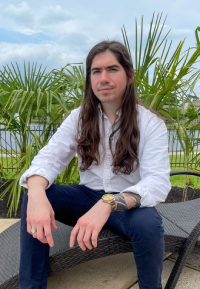Vanderbilt University graduate students Luis Bichon and Brandon Tyler Blankenship have been selected for the Department of Energy’s Office of Science Graduate Student Research program. Both will pursue their research on high-energy nuclear physics at Los Alamos National Laboratory. LANL is one of the world’s largest STEM research institutions doing formative research in space exploration, nuclear fusion, renewable energy, medicine, nanotechnology and supercomputing.


The program will provide Bichon and Blankenship with access to LANL’s state-of-the-art facilities and resources to advance their research and training, as well as professional preparation for jobs within a national laboratory. Research projects of SCGSR awardees are of significant importance to the Office of Science’s mission to address societal challenges at national and international scale.
“DOE has long been where the nation turns for scientific solutions to complex challenges, and now more than ever we need to invest in a diverse, talented pipeline of scientists, engineers and entrepreneurs who can continue this legacy of excellence,” Secretary of Energy Jennifer M. Granholm said in a release. “I’m thrilled that these outstanding students will help us tackle mission-critical research at our labs, and I can’t wait to see what their futures hold.”

Blankenship and Bichon study the quark gluon plasma, a state of matter that existed in the first microseconds of the universe that exhibits nearly perfect fluid behavior. QGP is the hottest and densest state of matter ever made in the laboratory. It is produced when nuclei collide at speeds close to the speed of light. Under these conditions, the protons and neutrons that comprise the atomic nuclei melt into a hot soup of quarks and gluons, said Victoria Greene, director of graduate studies in physics and astronomy and co-adviser to Bichon.
Bichon is working on the production of a special probe, the J/ψ particle, and examining its interaction with the QGP medium in nuclear collisions within the Relativistic Heavy Ion Collider, conducted at the Brookhaven National Laboratory. “The nature of the award is to travel and study with Cesar Luiz Da Silva and several other Pioneering High Energy Nuclear Interaction eXperiment collaboration (PHENIX) collaboration experts at LANL,” Bichon said. “I will have direct access to their in-house expertise for my development as an expert in PHENIX and J/ψ flow analyses.”
Blankenship’s research is focused on how heavy particles called charm and beauty quarks interact with the QGP and what can be learned about its fluid behavior from these interactions. “The DOE fellowship will allow me to conduct research with some of the world’s experts in my area of interest,” Blankenship said. “It’s a huge honor to be selected for the award, and it will be invaluable for my research objectives moving forward.”

“Both of these projects are very challenging,” said Julia Velkovska, Cornelius Vanderbilt Professor of Physics and adviser to Bichon and Blankenship. “Having won these fellowships will allow the students to work directly with the experts that built the detectors, learn from them and become experts themselves. This will give an incredible boost to their theses research. We expect to obtain unique physics results that will deepen our understanding of how a perfect fluid emerges from nuclear matter under extreme conditions.”
The students were selected from a merit peer review by external scientific experts. Since 2014, the program has provided more than 700 U.S. graduate students from 150 universities with supplemental funds to conduct part of their thesis research at a host DOE laboratory in collaboration with a DOE laboratory scientist.